#Studyblr advice
Explore tagged Tumblr posts
Text
how to start reading again
from someone who was a voracious reader until high school and is now getting back into it in her twenties.
start with an old favourite. even though it felt a little silly, i re-read the harry potter series one christmas and it wiped away my worry that i wasn't capable of reading anymore. they are long books, but i was still able to get completely immersed and to read just as fast as i had years and years ago.
don't be afraid of "easier" books. before high school i was reading the french existentialists, but when getting back into reading, i picked up lucinda riley and sally rooney. not my favourite authors by far, but easier to read while not being totally terrible. i needed to remind myself that only choosing classics would not make me a better or smarter person. if a book requires a slower pace of reading to be understood, it's easier to just drop it, which is exactly what i wanted to avoid at first.
go for essays and short stories. no need to explain this one: the shorter the whole, the less daunting it is. i definitely avoided all books over 350 pages at first and stuck to essay collections until i suddenly devoured donna tartt's goldfinch.
remember it's okay not to finish. i was one of those people who finished every book they started, but not anymore! if i pick up a book at the library and after a few chapters realise i'd rather not read it, i just return it. (another good reason to use your local library! no money spent on books you might end up disliking.)
analyse — or don't. some people enjoy reading more when they take notes or really stop to think about the contents. for me, at first, it was more important to build the habit of reading, and the thought of analysing what i read felt daunting. once i let go of that expectation, i realised i naturally analyse and process what i read anyway.
read when you would usually use your phone. just as i did when i was a child, i try to read when eating, in the bathroom, on public transport, right before sleeping. i even read when i walk, because that's normally a time i stare at my screen anyway. those few pages you read when you brush your teeth and wait for a friend very quickly stack up.
finish the chapter. if you have time, try to finish the part you're reading before closing the book. usually i find i actually don't want to stop reading once i get to the end of a chapter — and if i do, it feels like a good place to pick up again later.
try different languages. i was quickly approaching a reading slump towards the end of my exchange year, until i realised i had only had access to books in english and that, despite my fluency, i was tired of the language. so as soon as i got back home i started picking up books in my native tongue, which made reading feel much easier and more fun again! after some nine months, i'm starting to read in english again without it feeling like a huge task.
forget what's popular. i thought social media would be a fun way to find interesting books to read, but i quickly grew frustrated after hating every single book i picked up on some influencer's recommendation. it's certainly more time-consuming to find new books on your own, but this way i don't despise every novel i pick up.
remember it isn't about quantity. the online book community's endless posts about reading 150 books each year or 6 books in a single day easily make us feel like we're slow, bad readers, but here's the thing: it does not matter at all how many books you read or what your reading pace is. we all lead different lives, just be proud of yourself for reading at all!
stop stressing about it. we all know why reading is important, and since the pandemic reading has become an even more popular hobby than it was before (which is wonderful!). however, there's no need to force yourself to be "a reader". pick up a book every now and then and keep reading if you enjoy it, but not reading regularly doesn't make you any less of a good person. i find the pressure to become "a person who reads" or to rediscover my inner bookworm only distances me from the very act of reading.
#louisa-gc#academia#studyblr#aesthetic#book#books#reading#read#advice#help#university#study#uni#library#bibliophile#it girl#that girl#habits#booktok#booktube#bookstagram
6K notes
·
View notes
Note
other words to use instead of walk?
Advance - to move forward; proceed
Amble - to go at or as if at an easy gait
Canter - to move at or as if at a canter (i.e., a 3-beat gait resembling but smoother and slower than the gallop)
Footslog - to march or tramp through mud
Hike - to take a long walk especially for pleasure or exercise
Journey - travel from one place to another
Lumber - to move ponderously
March - to move in a direct purposeful manner
Meander - to wander aimlessly or casually without urgent destination
Mosey - to move in a leisurely or aimless manner
Pace - to walk with often slow or measured tread
Pad - to traverse on foot
Parade - to march in or as if in a procession
Patrol - keep watch over (an area) by regularly walking or traveling around or through it
Perambulate - to travel over or through especially on foot
Plod - to walk heavily or slowly
Prance - to walk or move in a spirited manner
Promenade - take a leisurely public walk, ride, or drive so as to meet or be seen by others
Prowl - to move about or wander stealthily in or as if in search of prey
Ramble - to move aimlessly from place to place; to explore idly
Roam - to go from place to place without purpose or direction; also to travel purposefully unhindered through a wide area
Saunter - to walk about in an idle or leisurely manner
Shamble - to walk awkwardly with dragging feet
Shuffle - to move or walk in a sliding dragging manner without lifting the feet
Slog - to plod heavily
Stalk - to walk stiffly or haughtily
Step - to move (the foot) in any direction
Stride - to move over or along with or as if with long measured steps
Stroll - to walk in a leisurely or idle manner
Strut - to walk with a proud gait
Stump - to walk over heavily or clumsily
Toddle - to walk with short tottering steps in the manner of a young child
Tour - make a tour of (an area); a short trip to or through a place in order to view or inspect something
Traipse - to walk or travel about without apparent plan but with or without a purpose
Traverse - to move or pass along or through; to move back and forth or from side to side
Tread - to step or walk on or over
Trek - to make one's way arduously
Troop - to go one's way
Trudge - to walk or march steadily and usually laboriously
Wander - to move about without a fixed course, aim, or goal
Hope this helps. If it inspires your writing in any way, please tag me, or leave a link in the replies. I would love to read your work!
More: Word Lists
#anonymous#writeblr#spilled ink#dark academia#light academia#studyblr#langblr#linguistics#words#walk#fiction#writers on tumblr#writing prompt#poetry#poets on tumblr#lit#creative writing#literature#writing reference#writing tips#writing advice#writing resources#word list#definitions from merriam webster and oxford
3K notes
·
View notes
Text
Random pieces of advice
The world is less scary and chaotic if you lie down on the floor
Noticing different kinds of light (stars, candles, sunshine or city lights) can bring back the feeling of wonder and hope
If you can't shower, washing your hands and face will help you feel better and cleaner
If you can't clean anything else, changing and/or washing your bedsheets can do wonders
Fresh air and being outside in general can help with depersonalisation
Spending time around animals can help you recognise what's important and calm anxious thought cycles
Techniques for emotional regulation in children can really help adults too
Putting random asortment of food on a plate without creating an actual dish still counts as a meal
Drink something warm
Delete that app
Treat yourself as if you were a kid. Buy yourself a toy, play around, learn about cool new things
Fast paced life isn't morally better and it's not good for everyone
There is no good reason to keep yourself hungry
Singing to your full lung capacity can be a great way to let out built up emotion
Tension in the face can cause headaches. Try to massage your face regularly
Nothing is as important as your health
You are a whole person on your own, you don't need someone else to be there to deserve love and attention. Your life can be full as long as you are present
You should cry things out whenever you feel like it
Slow walks are still movement and they do count
It's never as bad as you imagine it
Try changing your toothpaste flavor if you hate brushing your teeth
Anything can be a stim toy - one of my favourites is a heavy dragon necklace that has a complicated surfice. It's fun to touch and hold and it's not even "actual" stim toy
Procrastinating and feeling bad about it is true waste of time. Learn to truly rest. It takes the same amount of time but it is useful
Sometimes you have to force yourself to do the things that make you feel better
Don't trust the thoughts you have after not sleeping for a while
Friendships don't have to be forever to mean something
#greenstudies#mental health#mental illness#mental health advice#advice#tips#neurodivergent#lifestyle#studyblr
22K notes
·
View notes
Text
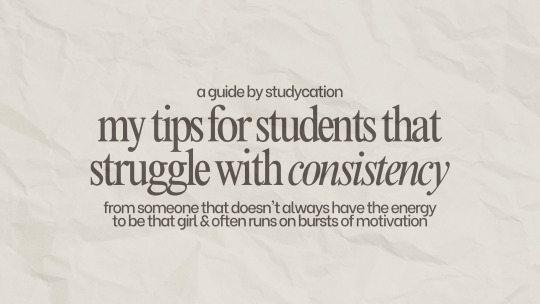
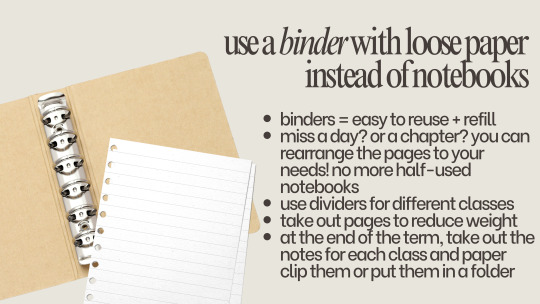
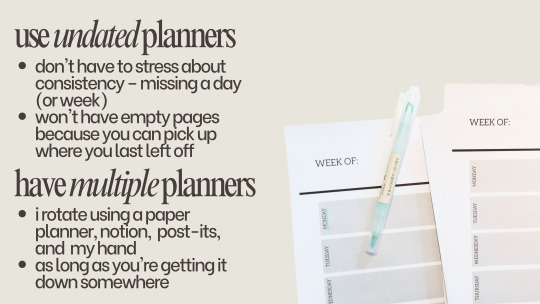
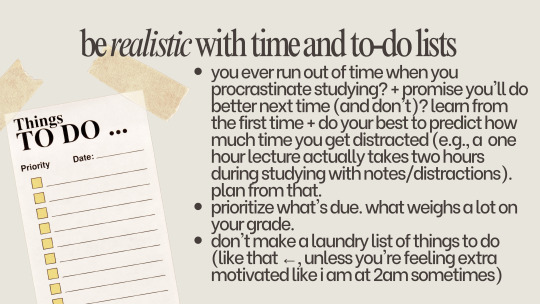
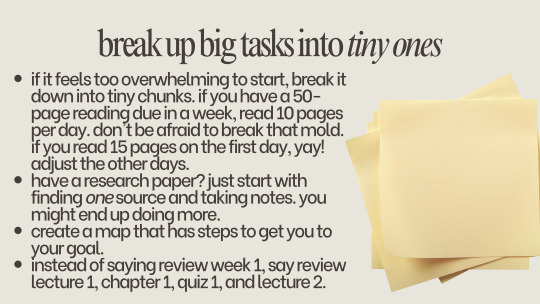
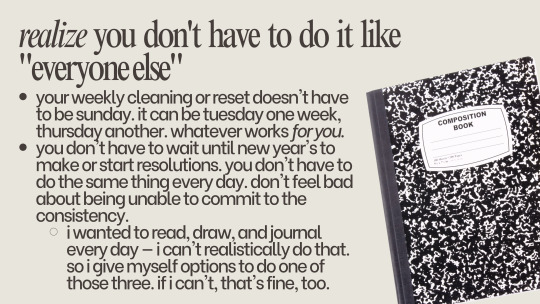
my tips for students that struggle with consistency
#studyspo#studyblr#studycation#studyblr community#school advice#school#study tips#adhd tips#adhd school tips#executive dysfunction tips#ways to be productive#productivity tips#back to school
4K notes
·
View notes
Text
You should never have shame about your academic journey. It's a journey. You're growing and learning. You're going to face challenges alone for one of the first times in your life. Shit's hard. It's ok to struggle.
I haven't had a pretty journey at all. I'm graduating with a bachelor's degree at 25. I've been in college nonstop since I was 18. I've failed a lot of classes and had to go part time. So many things have happened. But I will have the degree. And that degree is worth the exact same as someone who got it in 3 years. The knowledge I have is mine to keep.
How I got here doesn't matter. I'm here. I am going to graduate in a few months. I have won this chapter of my life. And to those who try to shame me for how I got here and how long it took, I pray that you never experience the things I have that have made it take long. May you live a life of comfort and luxury and have hands soft as silk until you die. And hopefully I will get the same grace from the universe eventually.
#study blog#student#student life#studyblr#productivity#school#study hard#studying#school advice#graduation
1K notes
·
View notes
Text
🍎✏️ Back to school advice for queer students, from queer people! 🏳️⚧️🏳️🌈
We asked, y'all answered. Some back to school advice for LGBTQ+ students:
❤️ "Learn Queer history. Learn Black history. Learn Native American history. Learn what has gone into making it possible for you to be who you are, with the amount of safety and support you have — even if it doesn't feel like much." -Brandyn
🧡 "Autistic queer here. Always being buried in a book saved me from a lot. And find your tribe." -queerintech_
💛 "Find your people for support - whether at school or outside of school. You are loved and appreciated for who you are. Anyone that says otherwise doesn't deserve to know you or your story. Our community is sending all the love and support to you everyday!" -Amy
💚 "To my young black feminine boy: be your authentic self, people will judge you, call you slurs, but don't suppress your beauty. To my beautiful black bisexual boy: you don't have to try so hard to suppress what you like, it's okay to like boys." -Tyreece
💙 "Find at least one safe teacher you can go to. You can do this by finding the rainbow sticker on their door or by finding a sign in their room!" -Sonia
💜 "Don’t think for one minute that being bullied should be tolerated. Find help, talk to friends about it. You have the right to be yourself. I also noticed that when I stood up for myself, I was respected more." -Jason
❤️ "Befriend the other little weirdos, they’re going to be the coolest adults (and so are you). Keep your eyes on the horizon, but also know for better or worse you’re never going to experience this time again, so try to make the most of it." -Patrick
🧡 "You don't owe anyone anything. If you don't feel safe to come out, that doesn't make you any less queer." -Kayenta
💛 "Something that three people told me that I now truly believe: 'There is nothing wrong with you. You don't have to change who you are to be loved and respected.' They were right. You will figure things out!" -Bert
💚 "So many people love you. Your teachers want to help - find the good ones. We are out there." -Deirdre
#it gets better#gsa#back to school#studyblr#high school#queer youth#trans youth#lgbtqia#queer advice#queer community
290 notes
·
View notes
Text
Academic advice that you must remember while you follow the "aesthetic"
romanticising school and studies by using aesthetics (i.e. Dark academia, art academia, chaotic academia, etc) is really helpful for motivation, but there are many things you must keep inmind
★ Stop romanticism of insomnia. I mostly blame dark academia fanatics for this (not all, but most). in order to remember what you have studied properly as the brain absorbs the information you studied while your sleeping and it maintains a good mental health. Put an end to the "sleep is for the weak" mindset. Cause no sleep actually makes you weak.
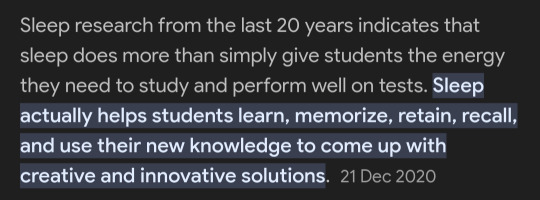
★ stop worrying about not having aesthetic notes with colourful pens, heading and doodles like you see in the "study with me videos". It doesn't matter how it looks, as long as you understand, that's the whole point of having notes in the first place. To study, it's not an assignment or project for you to spent hours switching between pens and markers.
Partly people are so deep focused on making everything look "aesthetic" and forget to study, which was supposed to be the main priority.
★ if you get a bad grade once in a while, don't get demotivated. Sometimes no matter how hard you study you won't get the result you want, it might sound cliché but all you can do is try again. No matter how good someone's grades are, these is always a moment where they get a low grade for wherever reason, instead of taking that as a cue to give up, take it as an opportunity to bounce back
(remember, some study hacks may work for some people but it won't work for everyone, so try to find a method that's best suitable for you)
★ Put you phone away when your studying, it's a huge distraction (wow mom was right) now, if your study materials are in your phone or you study through YouTube, then i suggest you turn off you notifications of social media apps (i.e YouTube, Instagram and even Tumblr)
Also not a study advice, but avoid using your phone when your eating, pls it's for you own good, and stop creating fake scenarios when you sleep, it's the reason you can't sleep dummy
#desiblr#cause i usually see my fellow indian classmates fall under these categories in many ways#just don't go overboard#chaotic academia#study motivation#studyblr#dark academia#study tips#light academia#art academia#witch academia#chaotic academic aesthetic#academic aesthetic#study advice#study aesthetic#spilled ink#academic validation#romantic academia
448 notes
·
View notes
Text
how I take notes on non fiction books
I recently made a post on my study method, and decided to make a whole separate post on my note taking method. The structure of the notes I write doesn't vary too much from my lecture notes to things I might have to read. A couple of useful informations you might want to know before I start actually talking about note writing is that I am mainly focused on studying history (tho I have had other humanities exams in my degrees), and that I study for oral exams in which the material is mainly composed of non fiction books, but sometimes include articles as well as lecture notes. Somehow I have also failed to mention that I am speaking about HANDWRITTEN NOTES. I only do handwritten notes, I don't work well digitally, so keep that in mind. And with this being said brace yourselves for a very long post. The bullet points I will be making are not really in a specific order and I will be including a few pictures too.
The first step when I am working on the materials for an exam is to figure out in which order I will be reading (and writing notes) the books. This hasn't really much to do with the notes themselves, but it's important to know which of your materials is more general and what other things go more in depth, so that you don't struggle too much while studying. Another plan related thing I always do is to write down each chapter of the book I have to study on my bullet journal and how many pages it is so I can plan my studying more comfortably. If the chapters are very long, and divided in subchapters I sometimes also write those down.
The goal of the notes I write is to fully take the place of the book, so they tend to be very detailed and long. I do this because the very act of writing is part of my study method, and working on things I have written down in my own words is just much better for the type of learner I am. So basically I read the book only once, then it goes back on the shelf and I work exclusively on the notes. This means my notes need to be detailed and well organized.
My method is to read a chapter, underlining important stuff as I am reading, and then right after I am done reading I work on the notes for that chapter before moving onto the next. I do this because it makes the note writing more effortless, I am fresh with informations I just read and I basically just need to skim over what I have underlined.
On underlining, since it is so important. I underline everything I will be including in my notes, it might seem much as sometimes it consists of full paragraphs, instead of key words. But this is okay because my notes I don't just copy and paste.
To create useful notes you need to be re-elaborating the informations. You need to read, understand what you read, and be able to write it down using your own words. That way the notes will be easier to review, they will often be composed of shorter sentences, and by doing so you are also actively making writing part of your studying and not just a mindless activity.
Personally I don't work well with full pages summaries, I need the text to be visually broken into sentences/small paragraphs, and I use a lot of symbols as well as abbreviations.
Symbols and abbreviations are in a way part of your very own language when you are writing notes, you tend to develop these with time, but they are so useful. I personally use different types of arrows, all caps words, position of the text in the page, different methods of highlighting and abbreviations (usually for words that come up often like country names, for example Italy becomes ita, France becomes fr, etc.).
Your notes need to be useful for you, they don't have to necessarily be comprehensible for another person (which means you can and will fuck up sentence structure because sometimes skipping a couple of words makes the notes shorter and still understandable), and they do not have to be pretty. They should be as tidy as possible, but again that might change from person to person, I have some very messy looking notes that make total sense to me. With time you'll learn what works best for you.
I have a visual memory so as I mentioned titles, highlighters, all caps, the placement on the page and other similar things are very important in my notes. I cannot fully exapain some of these things because some definitely only make sense to me in the moment (like the words I choose to write in all caps, or the way I highlight things).
I like to have a clear chapter and subchapter break (so that in case I need to refer back to the book it's super effortless). I like to write those with a red pen, usually the chapter title is in all caps and the subchapter in coursive, but it really depends.
I use only two highlighters in each set of notes yellow for dates, and the colour I associate with the book/the subject of the book (I have synesthesia I don't make the rules when it comes to colours). This of course might change depending your preferences and on the element of your notes you want to focus on. I like to have spacific colour for dates and time periods, because of course while studying history that is a fundamental element. If you are focusing on other subjects you might want to have a specific colour for names, or other elements.
I like to leave a big side margin to add either key words (especially in lecture notes since they might be messier and jump around informations more often), or additional information in a second time (sometimes it happens, after you read another book, or attended a particular lecture you have to add a couple of sentences and I rather have a blank space that never gets used rather than no space at all for emergencies).
I honestly mentioned everything that came to mind right away, but since note writing is now basically a mindless skill I have been practicing for years I surely forgot about something. I might end up adding to this post in the future or write another one. My note-writing method has also changed a lot thought the years from high school to university, it's a skill I have been perfecting for the past decade. This to say that depending on what you are working on things might change, and by experimenting with different things you might find out things that work very well for you. If you have any questions on specific things I didn't mention or that wen't clear my inbox is always open and I am more than happy to help.
Since this post is already very very long I am adding the pictures below the cut
Example of a page of notes before and after highlighting
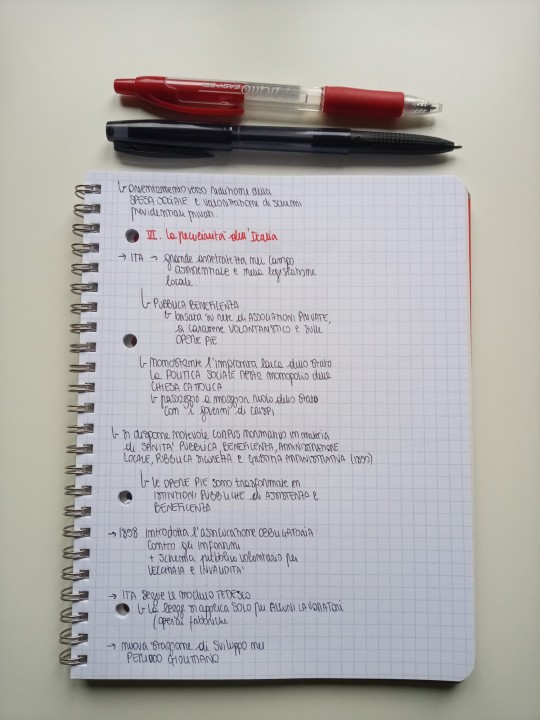
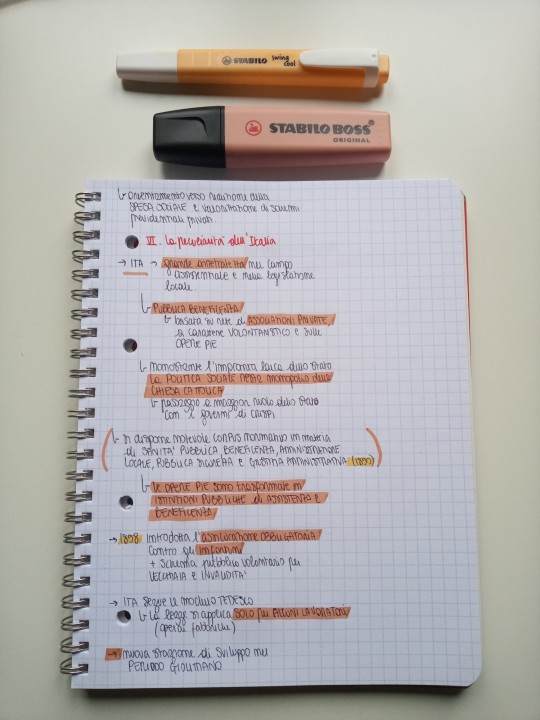
Example of symbols and structure of the notes and the way I highlight things (in which you'll hopefully be able to understand my handwriting, and in which there might be some spelling errors but alas that often happens in my real notes as well so if there are any it's for the sake of accuracy lmao). If I end up adding informations on the margins I always use a pen of a different color so I can tell which informations I got from what source (ex. main notes from lecture, colorful notes from additional article).
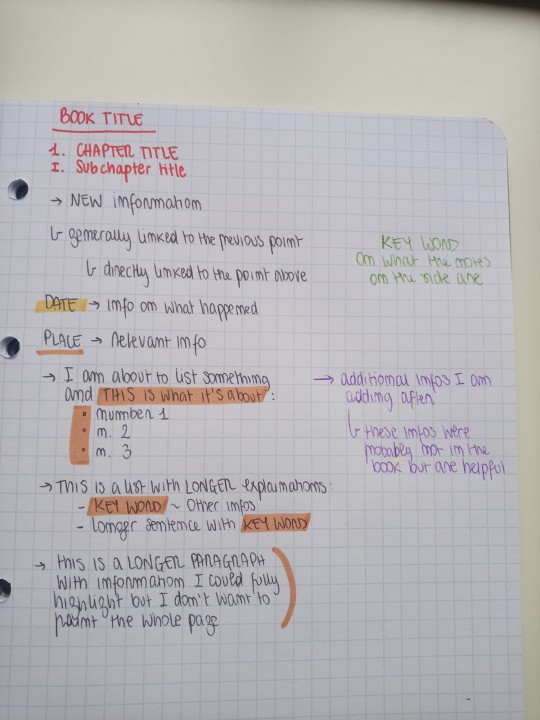
Example of messier notes in which the main text in black are the notes I took during lectures and the additional colorful text was added while writing the materials (I rarely do this, it usually happens when the lectures follow a book precisely, which happens when we have to study books or summaries written by the professor). As you can see I often use post it notes to add more writing space, and sometime I even use them to create visually separated sections. If I end up adding some drawings I also usually like to have them on post it notes so they stand out more (and if you are wondering why the hell would an history student need drawings it's usually either because I need a map or a region/state to mark things out, or when studying for archaeology exams I often needed visual references, for example to identify different types of vases or decorations).
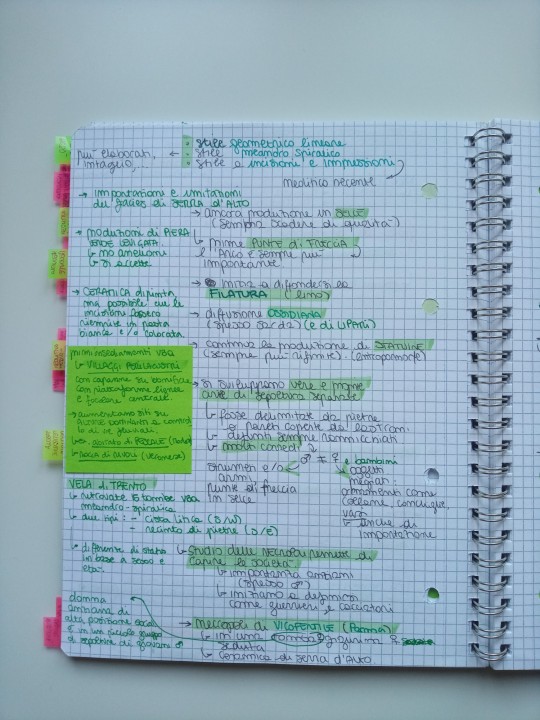
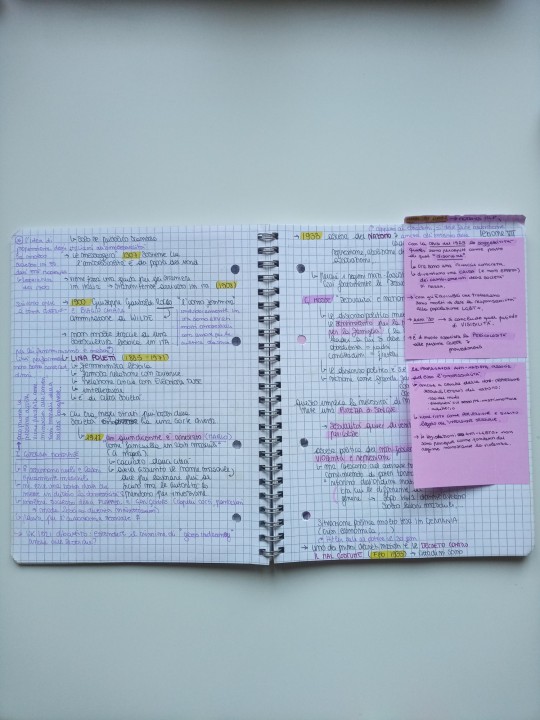
#this should be it#i was hoping on a more structured post but it was harder than i expected to write#both because so much of note writing is now a brainless activity for me and also bc it's really not easy to exaplain certain aspects#like the symbols i use#i really did my best and hope it will be useful#then again if y'all have questions the inbox is open and i will try my best to answer whatever your heart desires#studyblr#studyinspo#studying#study tips#study advice#note taking#hadwritten notes#my note taking method#how to take notes#non fiction books#academia#uniblr#university#booklr#study method#mine#the---hermit
153 notes
·
View notes
Text
Advice I would give my past self about studying Chinese

Recently I've been reflecting on my Chinese learning journey and how far I've come. If I could go back in time, these are 10 things I would tell my past self. A few are specific to Chinese, but most can apply to any language
It will get so much easier to learn new characters. I remember feeling overwhelmed because learning new characters was a painful process. Now when I encounter a new character, I can remember it with relative ease—it’s just a new combination of familiar components.
Don't feel bad about having uneven development in different skills. My listening and reading are significantly stronger than my speaking and writing. It’s super common and nothing to be ashamed of.
The best way to get over being too embarrassed to speak is to experience some embarrassment and realize it’s not a big deal. I used to be so afraid of making mistakes that I would avoid speaking in class. It was only by being forced to speak that I got over it. I'm much better for it!
It’s impossible to learn everything, and time is limited. You have to prioritize. You probably don’t need to know how to say “pawnshop” in Chinese, and trying to jam your head full of 100 words you saw once won’t work. They won’t stick.
It will actually be harder to read pinyin than to read characters at some point. When I helped a friend with a script for her Chinese class, I really struggled because she had written it entirely in pinyin. I had to write out the characters to read without stumbling! I know characters are daunting for beginners, but trust me, you will get used to them.
If you haven’t practiced or learned something, of course you won’t be good at it. I remember feeling so frustrated trying to navigate Chinese websites for the first time. In retrospect, obviously, I was going to struggle with something completely new to me!
If something isn’t sticking, move on. Why waste time on a word that’s not clicking when you could be learning five new ones? It will only result in unnecessary frustration. So unless you need to know it for your class or a proficiency test, drop it and move on.
Don’t beat yourself up when you have trouble understanding music, literature, different accents, etc. These can be challenging even in your native language. Of course you’re going to struggle more in a new language.
It's worth it to pay attention to things like stroke order and tones from the start so you don't form bad habits. Don’t stress about get it perfect, but it’s easier to do it right the first time than to have to correct your bad habits in the future.
Instead of feeling overwhelmed by all that you don’t know, learn how to express yourself with what you do know. It’s truly its own skill that requires practice. After all, in life you can’t always stop and pull out a dictionary.
I started learning Chinese a really long time ago, but I became more serious about it in 2018, so 5 1/2 years ago. I'm very proud of how far I've come, but I still have a long way to go! I look forward to revisiting this post in another couple of years 😊
#my learning#study tips and advice#chinese#mandarin#mandarin chinese#chinese language#studyblr#langblr#learning languages#language learning#chinese langblr#mandarin langblr#languageblr
612 notes
·
View notes
Text
academic resources⋆.ೃ࿔*:・📄

to be your best, pink academia, academic weapon, it girl self. this will be updated continuously ✨
PRINTABLES ;
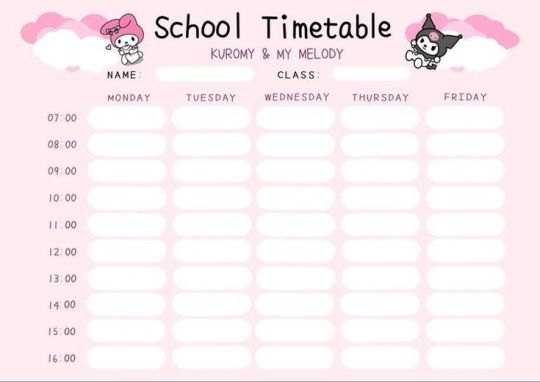

TUMBLR POSTS ;
how to get good grades without excessive studying - by yours truly
ways to romanticize school - @4theitgirls
studying methods + tips - by yours truly
youtube channels to help u out this semester - @4theitgirls
creating a study schedule and routine - @prettieinpink
how to study like rory gilmore - @itgirldiary
my studying plans as an accounting major - @iluvprettygirls
citation resources - @workitgurl
APPS AND WEBSITES ;
forest - studying timer
quizlet - studying tool (flashcards)
khanacademy.org
coursera.org
annualreviews.org
google scholar - research
google calendar - organization
notion - organization
#advice#it girl#becoming that girl#that girl#it girl energy#honeytonedhottie⭐️#pink academia#academic weapon#academic validation#studying#studying tips#studyblr#study aesthetic#study motivation#resources💬🎀#girly tumblr#dream girl#dream girl tips#dream life#girl blog#girl blogging#study methods#studyspo#light academic aesthetic#highschool
609 notes
·
View notes
Text
Writing Notes: Children's Dialogue
Language is extremely complex, yet children already know most of the grammar of their native language(s) before they are 5 years old.
BABBLING
Babbling begins at about 6 months and is considered the earliest stage of language acquisition
By 1 year babbles are composed only of the phonemes used in the language(s) they hear
Deaf babies babble with their hands like hearing babies babble using sounds
FIRST WORDS
After the age of one, children figure out that sounds are related to meanings and start to produce their first words
Usually children go through a holophrastic stage, where their one-word utterances may convey more meaning
Example: "Up" is used to indicate something in the sky or to mean “pick me up”
Most common first words (among the first 10 words uttered in many languages): “mommy,” “daddy,” “woof woof,” “no,” “bye,” “hi,” “yes,” “vroom,” “ball” and “banana”
WORD MEANINGS
When learning words, children often overextend a word’s meaning
Example: Using the word dog to refer to any furry, four-legged animal (overextensions tend to be based on shape, size, or texture, but never color)
They may also underextend a word’s meaning
Example: Using the word dog to refer only to the family pet, as if dog were a proper noun
The Whole Object Principle: When a child learns a new word, (s)he is likely to interpret the word to refer to a whole object rather than one of its parts
SYNTAX
At about two years of age, children start to put words together to form two-word utterances
The intonation contour extends over the two words as a unit, and the two-word utterances can convey a range of meanings:
Example: "mommy sock" = subject + object or possessive
NOTE: Chronological age is NOT a good measure of linguistic development due to individual differences, so instead linguists use the child’s mean length of utterance (MLU) to measure development
The telegraphic stage describes a phase when children tend to omit function morphemes such as articles, subject pronouns, auxiliaries, and verbal inflection
Examples: "He play little tune" or "Andrew want that"
Between 2;6 and 3;6 a language explosion occurs and children undergo rapid development
By the age of 3, most children consistently use function morphemes and can produce complex syntactic structures:
Examples: "He was stuck and I got him out" / "It’s too early for us to eat"
After 3;6 children can produce wh-questions, and relative pronouns
Sometime after 4;0 children have acquired most of the adult syntactic competence
PRAGMATICS
Deixis: Children often have problems with the shifting reference of pronouns
Children may refer to themselves as "you"
Problems with the context-dependent nature of deictic words: Children often assume the hearer knows who s/he is talking about
AUXILIARIES
In the telegraphic stage, children often omit auxiliaries from their speech but can form questions (with rising intonation) and negative sentences
Examples: "I ride train?" / "I not like this book"
As children acquire auxiliaries in questions and negative sentences, they generally use them correctly
SIGNED LANGUAGES
Deaf babies acquire sign language in the same way that hearing babies acquire spoken language: babbling, holophrastic stage, telegraphic stage
When deaf babies are not exposed to sign language, they will create their own signs, complete with systematic rules
IMITATION, REINFORCEMENT, ANALOGY
Children do imitate the speech heard around them to a certain extent, but language acquisition goes beyond imitation
Children produce utterances that they never hear from adults around them, such as "holded" or "tooths"
Children cannot imitate adults fully while acquiring grammar
Example:
Adult: "Where can I put them?" Child: "Where I can put them?"
Children who develop the ability to speak later in their childhood can understand the language spoken around them even if they cannot imitate it
NOTE: Children May Resist Correction
Example: Cazden (1972) (observation attributed to Jean Berko Gleason) – My teacher holded the baby rabbits and we patted them. – Did you say your teacher held the baby rabbits? – Yes. – What did you say she did? – She holded the baby rabbits and we patted them. – Did you say she held them tightly? – No, she holded them loosely.
Another theory asserts that children hear a sentence and then use it as a model to form other sentences by analogy
But while analogy may work in some situations, certainly not in all situations:
��� I painted a red barn. – I painted a barn red. – I saw a red barn. – I saw a barn red.
Children never make mistakes of this kind based on analogy which shows that they understand structure dependency at a very young age
BIRTH ORDER
Children’s birth order may affect their speech.
Firstborns often speak earlier than later-born children, most likely because they get more one-on-one attention from parents.
They favor different words than their siblings.
Whereas firstborns gabble on about animals and favorite colors, the rest of the pack cut to the chase with “brother,” “sister,” “hate” and such treats as “candy,” “popsicles” and “donuts.”
The social dynamics of siblings, it would appear, prime their vocabularies for a reality different than the firstborns’ idyllic world of sheep, owls, the green of the earth and the blue of the sky.
MOTHER'S LEVEL OF EDUCATION
Children may adopt vocabulary quite differently depending on their mother’s level of education.
In American English, among the words disproportionately favored by the children of mothers who have not completed secondary education are: “so,” “walker,” “gum,” “candy,” “each,” “could,” “wish,” “but,” “penny” and “be” (ordered starting with the highest frequency).
The words favored by the children of mothers in the “college and above” category are: “sheep,” “giraffe,” “cockadoodledoo,” “quack quack,” the babysitter’s name, “gentle,” “owl,” “zebra,” “play dough” and “mittens.”
BOYS / GIRLS
One area of remarkable consistency across language groups is the degree to which the language of children is gendered.
The words more likely to be used by American girls than by boys are: “dress,” “vagina,” “tights,” “doll,” “necklace,” “pretty,” “underpants,” “purse,” “girl” and “sweater.”
Whereas those favored by boys are “penis,” “vroom,” “tractor,” “truck,” “hammer,” “bat,” “dump,” “firetruck,” “police” and “motorcycle.”
Tips for Writing Children's Dialogue (compiled from various sources cited below):
Milestones - The dialogue you write should be consistent with the child's developmental milestones for their age. Of course, other factors should be considered such as if the child has any speech or intellectual difficulties. Also note that developmental milestones are not set in stone and each child is unique in their own way.
Too "Cutesy" - If your child characters are going to be cute, they must be cute naturally through the force of their personality, not because the entire purpose of their existence is to be adorable.
Too Wise - It’s true kids have the benefit of seeing some situations a little more objectively than adults. But when they start calmly and unwittingly spouting all the answers, the results often seem more clichéd and convenient than impressive or ironic.
Unintelligent - Don’t confuse a child’s lack of experience with lack of intelligence.
Baby Talk - Don’t make a habit of letting them misuse words. Children are more intelligent than most people think.
Unique Individuals - Adults often tend to lump all children into a single category: cute, small, loud, and occasionally annoying. Look beyond the stereotype.
Personal Goals - The single ingredient that transforms someone from a static character to a dynamic character is a goal. It can be easy to forget kids also have goals. Kids are arguably even more defined by their goals than are adults. Kids want something every waking minute. Their entire existence is wrapped up in wanting something and figuring out how to get it.
Don't Forget your Character IS a Child - Most of the pitfalls in how to write child characters have to do with making them too simplistic and childish. But don’t fall into the opposite trap either: don’t create child characters who are essentially adults in little bodies.
Your Personal Observation - To write dialogue that truly sounds like it could come from a child, start by being an attentive listener. Spend time around children and observe how they interact with their peers and adults. You can also study other pieces of media that show/write about children's behaviour (e.g., documentaries, films, TV shows, even other written works like novels and scripts).
Context - The context in which children speak is crucial to creating realistic dialogue. Consider their environment, who they're speaking to, and what's happening around them. Dialogue can change drastically depending on whether a child is talking to a friend, a parent, or a teacher. Additionally, children's language can be influenced by their cultural background, family dynamics, and personal experiences. Make sure the context informs the dialogue, lending credibility to your characters' voices.
Sources and other related articles: 1 2 3 4 5 6 7 8 9 10
Writing Notes: On Children ⚜ Childhood Bilingualism More: Writing Notes & References
#writing prompt#writeblr#writers on tumblr#spilled ink#poets on tumblr#writing notes#children#writing tips#literature#writing advice#writing reference#studyblr#langblr#linguistics#dark academia#dialogue#writing resources
3K notes
·
View notes
Text

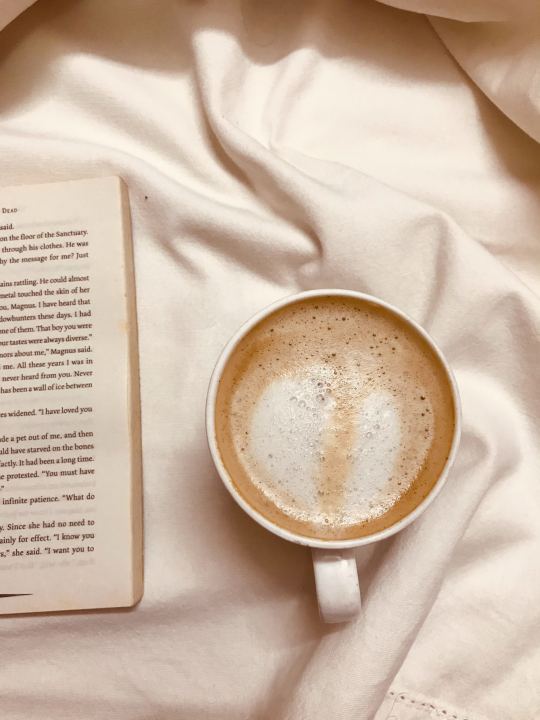

habits i should try to avoid burnout 🍵
to varying degrees, every semester i burn out. this one may become the worst i've had in recent years if i'm not careful bc of the way i'm trying to pack my schedule. anxiety has been unexpectedly high this week and it's only week 1! 😖
🐢 self-care:
get 8-10 hours of sleep daily
daily exercise - enough to get me physically tired enough to sleep
meditate AND journal daily
give myself at least one day a week to chill (probably will be a "reset" day bc i can't just vegetable and expect my brain to not self-destruct. for now, let's try saturdays.)
more quality time with the people i love throughout the week
fresh air + sunlight when the weather isn't too inhospitable
no phone mornings (i quickly fell out of the habit but it did wonders for my mental health 😭)
🐰 time management:
set reasonable goals. don't kid yourself into thinking you can complete everything on a to-do list you doubt you can finish even half of - if you doubt, you're probably right.
take plenty of breaks throughout the day
don't procrastinate bc procrastination's consequences will definitely lead to burnout. on the days you just don't feel it, give yourself a reason to study that speaks to you. what is demotivating you? give yourself the encouragement you need to not give up.
vary the order in which you do things so your days feel like they have more variety (e.g. vary the order in which you work on different subjects every day)
study based on energy level (i.e. try to study high-energy subjects when you have high energy and low-energy subjects when you have low energy. stop for the day when you're just not there anymore, don't try to push it.) this doesn't have to be contradictory to the point above cuz i still have lots of choices for what to do and my energy sometimes fluctuates like crazy throughout a single day.
#🍵#burnout#studyblr#studyspo#study tips#study advice#self care#time management#self improvement#becoming that girl#study motivation#procrastination#student life#stemblr#premedblr#codeblr#progblr#100dop#mathblr#study aesthetic#beige aesthetic#light academia#light academia aesthetic#romantic academia#classic academia
569 notes
·
View notes
Text
100 Hobbies To Try
Update: I wrote this at like 1 AM, so I was kind of half-asleep lol. A few people brought up that there were a bunch of duplicates in the list, sorry about that! I redid the whole list and ordered them alphabetically to avoid any repeating words. Hope you find the new list much more helpful!
Hobbies are a great way to practice self-care, and to have as a stress reliever. As uni students, we often find ourselves stressed out about our academic responsibilities, projects deadlines, and even financial concerns. We need some way to let out those stresses, and hobbies are one way to do it. You don't have to be good at them, you just have to enjoy doing them!
Here's a list:
Acrylic pouring
Antiquing
Archery
Astrology
Astronomy
Baking
Beekeeping
Bird watching
Bookbinding
Calligraphy
Canoeing
Candle making
Cartography
Chess
Checkers
Collecting coins
Collecting crystals
Collecting funko-pops
Cooking
Crochet
Crossword puzzles
Cycling
Dancing
Diving
DIY electronics
DIY home improvement
Drawing
Embroidery
Fencing
Filming
Fishing
Frisbee golf
Gardening
Genealogy
Geocaching
Glassblowing
Guitar
Homebrewing
Hiking
Horseback riding
Hot air ballooning
Ice skating
Inline skating
Jigsaw puzzles
Juggling
Kayaking
Kite flying
Kite surfing
Knitting
Lego building
Letterboxing
Magic tricks
Martial arts
Meditation
Metalworking
Model airplanes
Model building
Model rockets
Model trains
Mountain biking
Origami
Paper folding
Painting
Paragliding
Parkour
Piano
Photography
Podcasting
Pottery
Programming
Puzzle solving
Quilting
Rappelling
Reading
Rock climbing
Rollerblading
Running
Sailing
Sculpting
Sculpture carving
Scrapbooking
Scuba diving
Singing
Skiing
Soap carving
Soap making
Stand-up comedy
Stand-up paddleboarding
Stained glass crafting
Stargazing
Surfing
Traveling
Urban exploration
Urban farming
Virtual reality gaming
Web design
Wine making
Wine tasting
Writing
Yoga
#studyblr#study tips#study advice#study hacks#study tricks#university#school tips#student#student life#study motivation#hobbies#selflove#self care#self love#self improvement#self healing#mental health#emotional health#coping#coping mechanism#school advice#high school#school#students#college#uni student#university student#collegelife#college life#exams
750 notes
·
View notes
Text
Something that schools don't teach you but is much needed: how to have a work/life balance that works for you.
As someone who works fulltime and does classes and attempts a social life and hobbies, this gets very hard and stressful. But here are some tips I have for helping:
Learn to say no and not feel guilty. Picking up that extra shift when you had plans? Politely decline. Your friend is begging you to take ANOTHER class when your plate is full so you can have one together? Just be honest and say you can't.
Prioritize your sleep and eating. You can't function well if you don't sleep and eat enough. These are not things you can just push aside and do when you get the time. These are basic things you need to survive. These are literally basic needs. Don't throw them to the side. Your body does its best to take care of you. Make sure you take care of it too.
Have boundaries and be firm with them. If you tell your manager you can only work x, y, and z, don't let them add a or b to it. Respectfully but firmly let them know that you can't take on those things and if they have you do a or b, your work overall is going to majorly decrease in quality. Schedule time for yourself. For studying. For going out. And treat those set aside times just like you would if they were work or school times or appointments. You are the most important part of your life.
Understand that some weeks are going to be absolute hell. You're not going to have enough time. You're going to be exhausted and cry and throw things and want to quit everything. You got this babe. Take breaks and remind yourself how amazing you are and treat yourself after.
Prioritize things and adopt better habits. Wash your dishes right after using them. Get a set bedtime. Get easy breakfast things. Take a walk.
Your friends will understand if you just need time alone. I promise. They love you and don't hate you because you're overwhelmed. I PROMISE. And if they don't, maybe they aren't really your friends.
Not everyone is a friend. Some people are acquaintances. Some people are a 5 minute smoke break at work for your sanity. Some people are drinking buddies. Some people are library study date friends. And that's ok! Not everyone has to be your bestie. And trying to put that much energy into that many people will drain you.
#study blog#student#student life#studyblr#productivity#school#study hard#studying#school advice#work#work life#work life balance#balance#positive life#college life#life lessons#life advice#life
2K notes
·
View notes
Text
Learn to like bugs
Tips by someone who went from a bug hater to an entomology enthusiast
Learn more about arthropods - Being afraid of the unknown is a natural defence mechanism. This is luckily easily beat by learning! Insects, spiders and other tiny friends are very different from us and it makes our mammal brains struggle a little to understand. But that makes them more fascinating! Little creatures are so valuable and smart and social and you can learn all about it
Name and talk to the insects/spiders that you meet - You might feel ridiculous at first but this one really helps. It shifts the idea from "scary creature" to "just a little guy"
Hang out with people who love bugs - Passion and joy is infectious and nothing made me appreciate bugs as much as hanging out with entomologists
Visit exhibitions and join entomology walks - The whole vibe of these experiences makes bugs into something exciting (which they are!)
Be aware of how much space you take - You are a large mammal and you take up a lot of space both physically and with the way you live. Now it's okay to occupy space! You deserve to live and move freely and take up a piece of the world! But also realise that you take up space you don't use. The corners under the ceiling, sheds and storage spaces. Sometimes it's okay to leave this space to other, smaller roommates.
Exposure therapy - Let an insect walk on your hand. You'll find out it's fine. Start with something that doesn't scare you much and you can work your way up to scarier things. (Make sure it's safe to do so based on species and where you're from) For me the most difficult so far was a palm sized stag-beetle larva and it was fine! I didn't enjoy it but it felt really good to beat that fear
Many spiders pay rent - Spiders are a great pest control! I do recommend to check whether the spider isn't venomous but otherwise it's great to keep them around
Dangerous animals deserve to live - You should be careful and deal with these dangerous roommate appropriately. Sometimes this will mean you have to kill them but NEVER be cruel about it. You wouldn't hate a person for carrying pepper spray in dangerous areas, don't hate little friends for having defence systems
I know things like this can be difficult and you might not feel the need to even try but I promise it's worth it. It's just another part of our world to fall in love with. Just because you are big doesn't mean the small are unimportant.
658 notes
·
View notes
Text

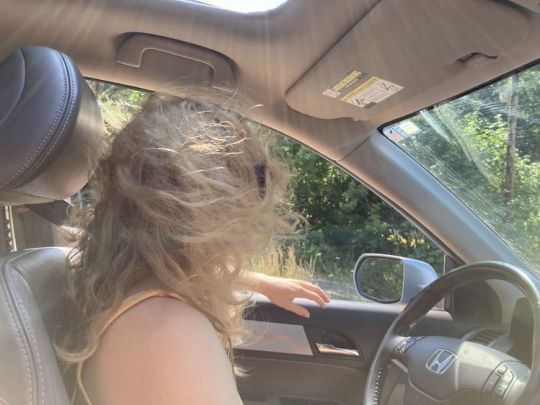
how to manage feeling overwhelmed
feeling overwhelmed can be really tough, but there are several strategies that can help you manage and reduce those feelings. here are some detailed steps you can take:
ੈ✩‧₊˚ identify the root cause: try to pinpoint what’s causing your stress. is it work, personal relationships, or something else? understanding the source can help you address it more effectively.
ੈ✩‧₊˚ accept your feelings: it’s important to acknowledge that you’re feeling overwhelmed. don’t judge yourself for it. acceptance can reduce the additional stress of feeling guilty or ashamed.
ੈ✩‧₊˚ practice mindfulness: mindfulness techniques like meditation, deep breathing, or yoga can help you stay grounded in the present moment. this can reduce anxiety about the past or future.
ੈ✩‧₊˚ break tasks into smaller steps: large tasks can feel daunting. breaking them down into smaller, manageable steps can make them feel less overwhelming and more achievable.
ੈ✩‧₊˚ prioritize and delegate: determine which tasks are most important and focus on those first. if possible, delegate tasks to others to lighten your load.
ੈ✩‧₊˚ take breaks: regular breaks can help prevent burnout. even short breaks to stretch, walk, or simply breathe can make a big difference.
ੈ✩‧₊˚ connect with others: talking to friends, family, or a therapist can provide support and perspective. sometimes just sharing your feelings can help alleviate some of the burden.
ੈ✩‧₊˚ practice self-care: make sure you’re taking care of your physical health by eating well, getting enough sleep, and exercising. physical well-being is closely linked to mental well-being.
ੈ✩‧₊˚ use grounding techniques: techniques like the 5-4-3-2-1 method can help you stay present. name five things you can see, four things you can hear, three things you can touch, two things you can smell, and one thing you can taste.
ੈ✩‧₊˚ seek professional help: if your feelings of overwhelm are persistent and affecting your daily life, it might be helpful to speak with a mental health professional for additional support and strategies.
remember, it’s okay to feel overwhelmed sometimes. taking steps to manage these feelings can help you regain control and feel more balanced.
❤️nene
#that girl#becoming that girl#study blog#chaotic academia#productivity#student life#student#it girl#academia#it girl aesthetic#overwhelmed#gen z#doom scrolling#mental health#procrastination#problems#stem student#studying#study motivation#university#university student#studyblr#advice#life advice#good advice#it girl energy#it girl era#it girl mentality#pinterest girl#girl blogging
140 notes
·
View notes